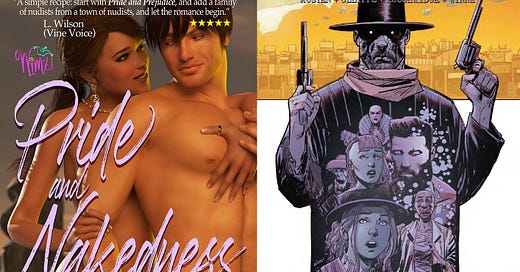Scott McCloud once said to me, “When you create something new, you build an audience of like-minded people. Readers you enjoy having lunch with.”
I was invited to lunch with some X-Men fans once. I thought it would be fun to see what they had to say. Mostly they wanted to tell me what I was doing wrong as a writer for the series. One person would tell me over their burger and fries exactly what they didn’t like about what I was doing, and then the next person would say, “well, that doesn’t bother me as much as (SOMETHING ELSE).”
And the next person would repeat the cycle.
This is the inherent problem with writing for company-owned, pre-existing characters—often even when it’s a later book in a series you created—such as when discussing whom Harry Potter should have married. Fans of a work will develop and flesh out their own mental stories (Harry will marry Hermione), and get upset when what they imagined doesn’t happen. Then—weirdly—they turn on the person who created the series they enjoy so much.
Want to write the greatest Green Lantern story, ever? Okay. Could be fun. Which Green Lantern would star in your “greatest Green Lantern story, ever?” Some people love Hal Jordan. Some prefer John Stewart. There are a lot of Kyle Rayner fans. There are even quite a few Guy Gardner devotees. Many don’t like other iterations, only their favorite.
So tell me a Greatest Green Lantern story that doesn’t alienate some—or all—Green Lantern fans.
People often tell me, “I have the greatest idea for (FILL IN THE SUPERHERO BLANK).” My response is always, “You should do your own thing,” which often—sadly—deflates them. One person actually admitted “that’s scarier.” Yeah, it is.
I get it. I do. There’s a real joy in getting your shot at a cultural icon like Superman, X-Men, or Wonder Woman. I sure had fun writing them. And I learned a lot about writing, collaboration, and visual storytelling in the process. It enhanced my career in animation. Even made me some money—though not as much as people think. And I understand the fear of creating something original—from your heart—and having it rejected, or criticized. Stomped on. Noted, and dismissed.
I’m not going to sugarcoat it. It does happen. And it hurts.
But very rarely does someone come up to me and say, “I loved your run on (FILL IN THE SUPERHERO BLANK). I re-read it all the time. It changed my life.” It happens, but it’s extremely rare. And yet I still have people say that about Hero Sandwich. Or my brief stay on Miracleman which I didn’t even write. Or—widening out a bit—my more personal projects like Flywires, Edgeworld, Love, or more often my novels like Pride and Nakedness (and, yes, I know this isn’t ‘my’ property, technically).
People are moved, and connect with the personal. With the deeply felt. I get comments and emails thanking me for helping Rad Sechrist bring Kipo and The Age of The Wonderbeasts into existence. I get a lot of underserved thanks for Steven Universe (I was just the support structure on both of those. The repository of experience. The genius was all Rad, and Bill, or Rebecca, Ben and Matt. But it was original genius).
You could write another Batman. Or you could create the dark, intense, and really wonderful Left on Mission or Blacking Out, as my friend Chip Mosher did. Time better spent, IMO.
You will get criticism from people outside your circle of understanding on an original. But they will go away. It’s called ‘finding your audience',’ and your first book is ‘the sacrificial lamb’ that will get most of the criticism. But those complainers rarely buy book 2.
It won’t be like writing a ‘bad’ X-Men story, or a ‘bad’ Batman story where the fans were there before you, think they know more about what makes a good X-Men/Batman story than you do, and so are more dug in, stick around, and continue assaulting you online, and (sometimes scarily) in-person hoping they can bully you away to be replaced by someone they may love, but other X-Men/Batman fans will probably hate.
In the end, there is no winning in work-for-hire. Other than the meager paycheck, and potential notoriety.
The only reason to write (or draw) someone else’s creation is the built-in audience, guarantee of interest, and potential sales. Money, exposure, and experience. Learn as you get paid. Build a name for yourself for when you launch your own creations.
You can go that route.
But I recommend skipping that step, and going right into becoming a god, breathing life into your very own universe.
Right now.
Self-publish it if you can, animate it yourself, build your own animatic, or storyboard and stay away from the Gatekeepers. Most of them are going out of business, anyway, because they don’t know what they’re doing any more than you do—so trust yourself over them.
Create something new, build an audience of like-minded people—readers you will enjoy having lunch with.
NEXT enCOURAGEment: Avoid the Gatekeepers. Most of them are idiots, anyway.





